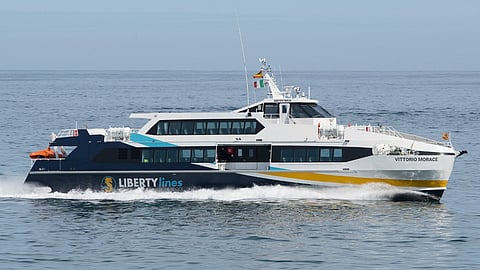VESSEL REVIEW | Vittorio Morace – Hybrid inter-island ferry for Italy's Liberty Lines
Italian ferry company Liberty Lines recently took delivery of a new hybrid monohull vessel built by Spanish shipyard Armon. The ferry has been named Vittorio Morace in honour of the late founder and former chairman of Liberty Lines. Construction was completed in compliance with RINA guidelines including the Green Plus class notation.
The ferry belongs to a series that was developed to satisfy Liberty Lines’ requirement for new vessels that offered the same performance as the company’s current fleet but were also capable of operating with reduced environmental impact. This was to ensure that the fragile ecosystems at the various island destinations served by the company will not be disturbed even as the ferries complete regular trips year-round.
Hybrid propulsion with various operating modes
Vittorio Morace has an LOA of 39.7 metres (130 feet), a beam of 8.25 metres (27.1 feet), a draught of 1.8 metres (5.9 feet), a depth of four metres (13 feet), and space for 251 passengers and seven crewmembers. Power is provided by two MTU 16V4000 M65L 2,560kW (3,430hp) diesel engines driving propellers via Reintjes gearboxes.
The propulsion setup also includes two Danfoss Editron 130kW e-motors and electric systems, two variable-speed gensets, an EST Green Orca 346kWh battery pack, DC switchboards, and an electrical power management system. A shore power connection is also available for charging the batteries for longer periods, such as stays in port.
All components are coordinated by MTU’s NautIQ Blue Vision NG control and monitoring system. The complete propulsion system will be monitored by the MTU NautIQ Foresight equipment health monitoring system. It collects data on the technical condition and analyses and stores it in order to improve the operational availability of the vessel, reduce maintenance costs, and lower fuel consumption and thus CO2 emissions.
The ferry is able to cruise at up to eight knots in full electric mode for 30 minutes when operating in ports and to recharge its batteries even while underway. A maximum speed of 30 knots and a service speed of 28 knots can be achieved when in conventional operating mode, though hybrid mode will also permit high cruising speeds.
Liberty Lines said the propulsion arrangement already complies with IMO Tier III emissions requirements even though these are not yet in force in the company’s areas of operations in the Mediterranean.
Fast transits combined with adequate amenities
Recent sea trials showed that Vittorio Morace exceeded contract requirements. The ferry demonstrated a top speed of 33 knots while 30 knots was reached under full load conditions. Even when running on only one engine, the ferry was able to achieve a full load top speed of 20 knots.
The propulsion may be modified in the future to run on hydrogen as a low-emission fuel. The MTU engines’ current configuration means they can also use hydro-treated vegetable oil (HVO), which Rolls Royce claims can help reduce the ferry’s CO2 footprint by up to 90 per cent. The manufacturer also said the comparatively low overall weight of both the engines and the hybrid drive system contributes to high vessel propulsion efficiency, thereby reducing fuel consumption and emissions.
The main deck features seating for 166 passengers, five toilets, and a kiosk/bar amidships while the upper deck has seats for 85 passengers plus an additional two toilets. Large luggage racks are situated throughout the vessel’s two passenger cabins, in addition to overhead luggage bins.
Another eight ferries from the same series are under construction at Armon's facilities, and Liberty Lines expects to take delivery of all remaining vessels by 2026. The vessels’ area of operation will encompass the waters between Sicily and the neighbouring Aeolian and Egadi islands as well as between the Italian mainland, Croatia, and Slovenia.


